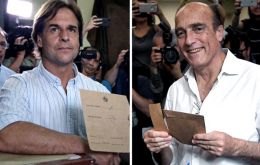MercoPress. South Atlantic News Agency
Tag: Daniel Martinez
-
Friday, November 29th 2019 - 09:58 UTC
Uruguay's incumbent candidate salutes president elect Lacalle Pou; transition talks begin next Monday

Luis Lacalle Pou of the center-right National Party won Uruguay’s presidency after his rival conceded four days after a runoff election. A second vote count by the country's Electoral Court confirmed and widened the neck to neck difference between the president elect and the incumbent candidate
-
Monday, November 25th 2019 - 09:59 UTC
Uruguay's presidential runoff results delayed because of the very tight results

Uruguay Sunday's presidential runoff results have been so tight that the Electoral Court will only make a definitive announcement sometime late this week after it has completed counting all votes, including some 34.000, classified as “observed”. This is because the difference between the two candidates is some 29.000 votes.
-
Saturday, November 23rd 2019 - 09:59 UTC
Uruguay Sunday's presidential runoff, a multicolor power switching with strong winds of change

This Sunday 2.7 million Uruguayans will cast their ballots in the presidential runoff, which according to all opinion poll forecasts, will have Luis Lacalle Pou, the leader of an opposition multicolor alliance as head of the Executive next March, but equally significant, power switching, it will mark the end of fifteen years of almost undisputed predominance of a catch-all coalition, Broad Front, which ruled South America's smallest country for three consecutive five-year mandates.
-
Tuesday, November 19th 2019 - 23:41 UTC
Uruguay presidential elections: Lacalle Pou would widely win, according to polls

After a long election campaign, Uruguayans live the last days before the second round of the presidential elections, which will take place on Sunday, November 24. The latest polls before the ballotage positions the nationalist Luis Lacalle Pou as the next president of the country, breaking the hegemony of the left that the Frente Amplio (Broad Front) imposed in the last 15 years.
-
Saturday, November 16th 2019 - 09:41 UTC
Uruguay election runoff: “Game over, I'm the boss”, Mujica tells the incumbent candidate

Next 24 November Uruguayans will cast their runoff ballot to elect the next president, scheduled to take office in March 2020. The dispute is between the two winners of the first round on 27 October, the candidate from the ruling coalition that has enjoyed fifteen years in office, and the leader of the opposition who has managed to conform a working “multicolor” majority in the next Legislative, and is ahead in opinion polls tendencies.
-
Thursday, November 14th 2019 - 09:57 UTC
Uruguay presidential debate focused on economy and security ahead of the ballotage on November 24

In a tense debate a week and little of the second round of the presidential election in Uruguay, on Wednesday night the candidates offered profound differences both in terms of economy, public security and the country's positioning in foreign policy mentioning the dictatorship of Venezuela.
-
Monday, October 28th 2019 - 09:58 UTC
Winds of change in Uruguay: ruling coalition stumbles, next government will be “multicolor”

Winds of change have swept in Uruguay. After fifteen years in office, and enjoying an absolute legislative majority, the Broad Front could lose control of the Executive on 24 November, when a runoff is scheduled among the two most voted candidates this Sunday.
-
Saturday, October 26th 2019 - 09:59 UTC
Uruguay votes on Sunday with a strong forecast change in the air

Uruguayans head to the polls on Sunday to elect a new president, 30 senators and 99 Lower House members. If none of the eleven presidential candidates manages 50% of cast votes plus one on 27 October, a runoff between the two hopefuls with most support is scheduled for 24 November.
-
Wednesday, October 23rd 2019 - 21:54 UTC
Uruguay Sunday’s general election: To a second ballotage and without parliamentary majority

On Sunday, October 27, in Uruguay, a new president, and Parliament will be elected. According to pollsters, the same parties as in 2014, the official Frente Amplio (FA, Broad Front) and the conservative National Party, will go on second ballotage in November. However, the novelty is that the Legislature will be made up of a minimum of six parties (a historical record) and a maximum of nine.
-
Tuesday, October 8th 2019 - 09:56 UTC
Uruguayan election: “a ponies race, no thoroughbreds competing”

On Sunday 27 October the Uruguayan electorate will be voting for a new president (there is no immediate reelection) and a renewed Legislative, 30 Senators and 99 Lower House members. Uruguay is one of the more stable countries in the region, both it's solid institutions as well as its citizens who are deeply committed to democracy, social rights and a strong presence of government in the economy.
